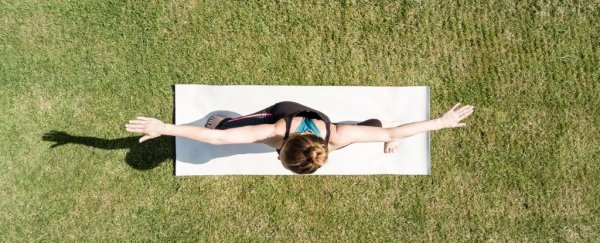Some types of yoga focused on mindfulness and meditation might help to treat generalised anxiety disorders, but perhaps only in the short term, a new trial suggests.
While cognitive behaviour therapy (CBT) remains the gold standard for those experiencing chronic nervousness and worry, recent evidence suggests yoga could be a promising complementary treatment - at least for some.
Professional CBT therapy is expensive, time-consuming, and difficult to access for many people, and yet it's also one of the most well-supported therapies for treating chronic anxiety.
Yoga hasn't been researched nearly as much, but even though the evidence is scant, preliminary results suggest it can reduce anxiety and stress with no apparent negatives.
But how it fares compared to other treatments, such as CBT, is less understood, and that's what this new trial set out to determine for patients.
"We need more options to treat anxiety because different people will respond to different interventions, and having more options can help overcome barriers to care," says psychiatrist Naomi Simon from New York University.
"Having a range of effective treatments can increase the likelihood people with anxiety will be willing to engage in evidence-based care."
Over the course of the 12-week trial, 226 adults with generalised anxiety disorders (GAD) undertook a randomly-assigned treatment, either 20 minutes per day of CBT, Kundalini yoga, or lessons in stress management.
Kundalini is a school of yoga where physical postures are taught alongside meditation, breathing techniques, relaxation exercises, and body awareness. Given the overlap between many of these practices and CBT, the authors thought both treatments would be relatively similar in effectiveness. They were not.
At the end of the trial, an assessment found roughly half of those in the yoga group responded to their treatment, compared to about a third of those in the stress education classes. But almost three quarters of those who undertook CBT met the criteria for having improved.
A few months later, a follow-up assessment found CBT was still significantly better than stress education. Yoga, on the other hand wasn't, suggesting that while it may have short-term positive effects, they may not last.
"Many people already seek complementary and alternative interventions, including yoga, to treat anxiety," says Simon.
"This study suggests that at least short-term there is significant value for people with generalized anxiety disorder to give yoga a try to see if it works for them. Yoga is well-tolerated, easily accessible, and has a number of health benefits."
The authors aren't really sure why they found yoga didn't have as much of an impact in the long term as CBT, or why those who practised yoga and CBT did not show overall changes in mindfulness.
"Greater mindfulness was associated with better treatment response," the authors write, "but the active treatments did not increase mindfulness significantly more than [stress management] did."
Clearly, we still need to know more about how CBT and yoga actually help alleviate chronic anxiety, but it seems like they do help to some extent.
Another small trial among women with GAD recently found that kundalini yoga for eight weeks was associated with lower anxiety. Whether this stands for other types of yoga remains to be seen.
In light of new findings and the available literature, the authors of the new study see kundalini yoga as a helpful but "only moderately potent" treatment for GAD.
The study was published in JAMA Psychiatry.
